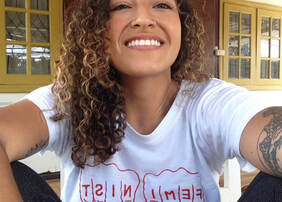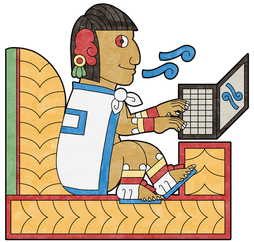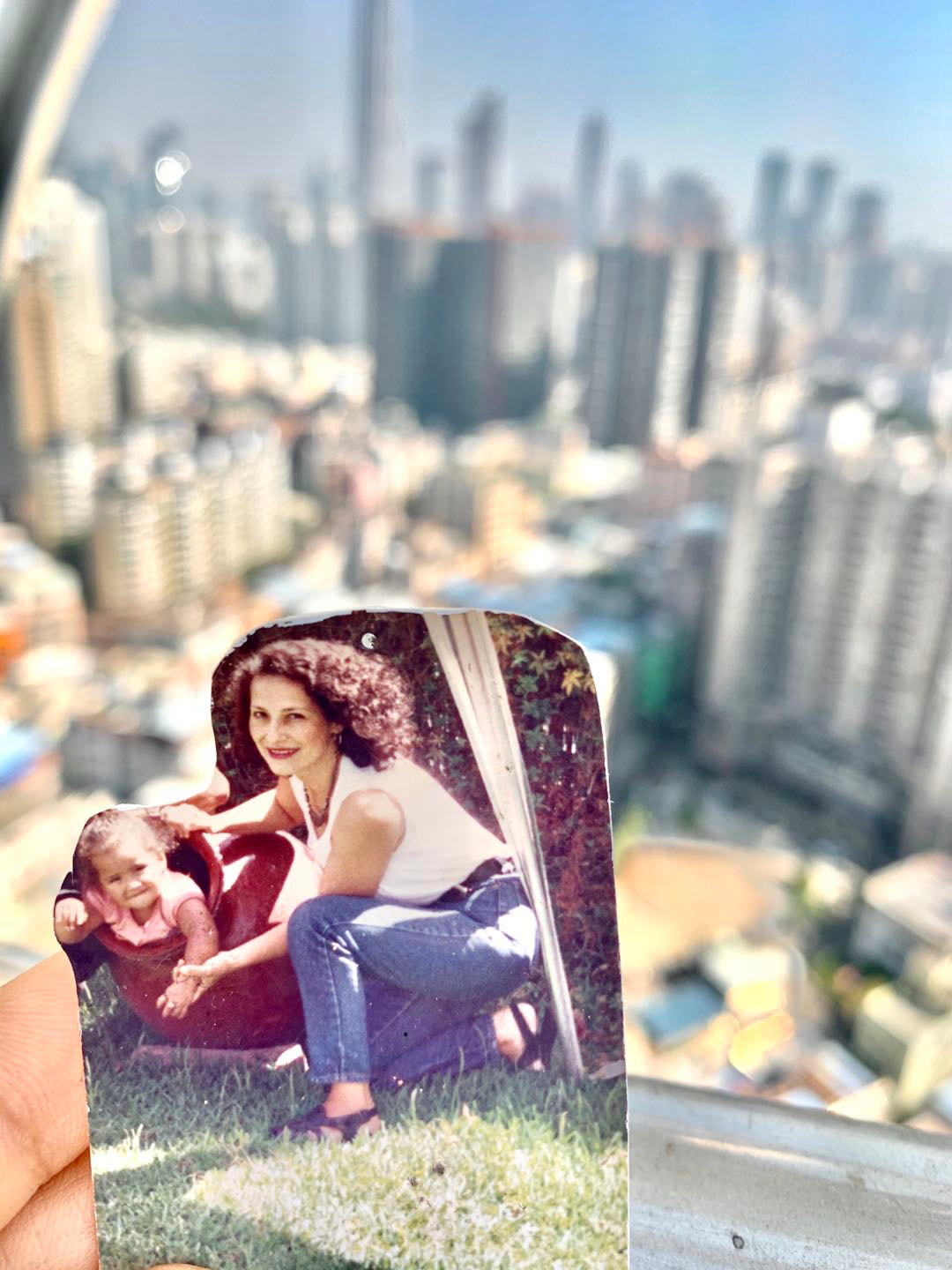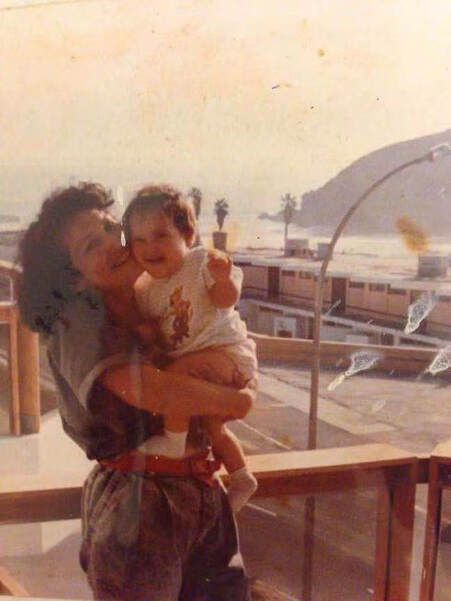Gringasby Ainhoa Palacios Each stop sign’s location was known to her. There was no need to switch lanes or deal with bad traffic, which is why it was the only road my mother felt safe driving on. One long winding road — Grand Regency Ln. It snaked past an AMC theater and a T.J.Maxx, before crossing a large intersection and keeping on past a Target and Barnes & Noble, finally and gently leaving us at Wal-Mart's doorstep, where we now got our groceries from. Before Wal-Mart, there was Dollar Tree. We'd walk there every Wednesday evening, my mother’s only fleeting time off. We took an hour skimming the two food aisles as if our shopping list wasn’t the same as last week. Elena routinely dumped ten cans of Vienna sausages in the shopping cart, the metal tins making a loud clank that had become so sweet and familiar. A tradition almost. She then immediately disappeared and came with a box of ramen which she stuck on the bottom rack of the cart. Baked beans, tuna, Nissin Cup Noodles, Uncle Ben’s instant rice, a 60-count bag of silver-dollar pancakes, a loaf of white bread, ham, suspiciously-gold-and-individually-wrapped-slices-of-cheese—that was our cart. During the 45-minute walk home, we each carried as many bags as we could stand, stopping often to readjust and shake our hands out. We played I Spy—better known to us as Veo Veo. Those Wednesday-dollar-store-veo-veo grocery trips only lasted a few months, stopping when my mother finally bought a car. The car was red. The seats inside, a tan suede with random stains of unknown origins. One of the back passenger doors was imprinted with a bowling ball-sized dent. It had a working radio and A/C, something I only learned to appreciate months later when a teenage girl rear-ended us, and the following car my mother purchased for $2,000 didn’t have the luxury of a working radio and A/C. The little red car had good gas-milage and airbags too, though those details I learned from my mother's praising of the car. “It is such a blessing, this little car. It serves us well,” she would say in response to Elena who complained that it made a sputtering sound so loud you couldn't hear ambulances behind. “It is embarrassingggg,” Elena whined, drawing out the last word with the sarcastic tone of an almost-teenage-girl. I can’t remember when Wal-Mart became synonymous with ghetto. When all I saw were other brown people in much too small shirts, their bellies draping over jeans. Men with greasy ponytails and lightly stained ‘wife beaters’. I can’t remember the moment I started to say to my friends, "I only shop at Target", where every aisle was brightly lit and organized and the bathrooms didn't smell like shit. Where there wasn’t a McDonalds but a Starbucks, and the employees were white teenage girls instead of chubby worn-out single moms. But before there was "I only shop at Target", there was me, 3’ 8” with unruly curls, holding my mom’s hand and asking question after question about the first day of school. “¿Cómo se llama mi professora? ¿A qué hora viene el bus? ¿Qué voy a almorzar?” It was our very first back-to-school shopping trip for our very first day of school in America. America. Each time I heard the word America I was filled with a sense of wonder. America. The land of opportunity. America. The land of English. America. The land of blue-eyed children. But before I could dive into 'America', we needed uniforms. I asked my mom what they looked like. “No se,” she said. They’d told her to go to a Wal-Mart. “You’ll see them there,” they assured. This confused me. How would we magically know which ones they were? Why didn’t they show her a photo? But it didn’t matter. I was six and a lot of things confused me, and I knew if I asked, I wouldn’t understand any better, and Elena would roll her eyes and tell me to stop being so pesada. The uniforms were there. Right in between the girl’s section and the boy’s section. There were choices. The general idea was a polo shirt, and any linen bottom so long as the colors were bleach-white, hunter green, navy blue, khaki, or maroon. “Algo más que planchar,” my mother said with a grunt. She hated ironing. She hated all things housework. The day we walked into our new American apartment, she couldn't stop talking about the washing machine. How grateful she was she would no longer have to wash clothes by hand, how it would save hours of her life, how this was all she’d ever wanted in life, how she felt like she could breathe again. Elena called her dramatic. Mom told us we could each get two bottoms and five shirts. Seeing Elena’s face of outrage, she followed her statement with “Yes, Elena. You’re going to have to wear the bottoms twice. But now, you can wash them with our new washer and dryerrrrrr!” she drew out her last word as if she was mocking Elena… “Maybe later we will buy more.” My mother never used the word “afford”, but even at six, I knew that’s what she meant. My mother held onto two papers, each a list of the supplies Elena and I would need. “¡Quiero ver! ¡Quiero ver!” I jumped by her side trying to peek. My mother handed me my paper, and Elena’s hers. There was thick bold font at the top. From later syllabuses, I imagine this one must have said something like, Mrs. Ramlow’s 2nd Grade Class. Below the fat black font was a bulleted list of yet more words I could not read. My mother’s handwriting beside each item was useless to me. I could read some cursive, but not hers. Hers was far too harsh and edgy. I must have looked defeated when I handed her back the paper because she smiled, winked, and blew me a kiss. “I’ll read it to you and you go get it, okay?” Oh, how excited I was to run around the aisles, be on my own, free to look for new mechanical pencils and three-ring binders. I knew exactly which to grab, the generic brand, the things that sat above the lowest number. The night before school started, I couldn't sleep. “¡Estoy muy emocionada!” I shouted while I bounced on my mother’s bed. “¿Quieres té?” she took out a mug and pulled out a lilac box with a picture of a snoring-pajama-wearing-bear sat in a rocking chair. She made this tea for herself every night. And every night, she also reached for the clear bottle of Agua de Azar from the medicine cabinet. I never did know what Agua de Azar was, other than what she gave me when I had a stomachache, or felt like throwing up, or couldn’t sleep, or cried so hard my eyes swelled. We pulled up to a brick circular building in our sputtering red car and parked. A thin white woman and a plump brown woman were waiting for us in the lobby. The white woman shook my mom’s hand, while the plump brown woman knelt without actually letting her knees touch the carpet.“¡Hola!" she beamed. "Me llamo Mrs. Lopez. Yo seré la maestra de ESOL para las dos. Es un gusto conocerlas." ESOL, I’d find out later, stood for English for Speakers of Other Languages. Elena and I both nodded with a smile, mine always naively bigger than hers. We walked into the white lady’s office, who I’d already nicknamed La Gringa, though my mother would later remind me to use her name— Principal Kathy. “Okay, bebe. See you later okay?” my mother kissed me goodbye. I held Principal Kathy’s hand though I didn’t particularly want or need to. They felt strange, so boney and pale next to mine. Principal Kathy was both tall and lean. She had stringy blonde hair and a very pointed nose that reminded me of the parrot we once had in Peru. Her face was lined with deep grooves that left me unable to decide if she was pretty or not. All in all, she looked exactly how I’d always pictured a gringa. We walked in silence towards our classrooms. Mine came first. When we got to the door, the white lady inside was also tall, but this time, curvy with hair that reminded me of burnt orange peel. Another gringa. A more eccentric one. As soon as she noticed us, her face erupted into a smile, her eyes looking at me like I was the cutest kitten in the litter. When Principal Kathy left with Elena, I sat in a cubby-holed-desk just like the movies. Burnt-orange-peel-haired-Mrs. Ramlow turned on the television. There was an image of the American flag which for some reason prompted everyone to set their pencils down and stand up, their chairs making a piercing screech as they grated against the tile in unison. They put one hand over their chest. I did the same. The room echoed with voices. I opened and shut my mouth trying to match their pace. Mrs. Ramlow looked at me subtly, a tiny smile peeping as if she were holding back a giggle. As if the kitten was somehow cuter than she expected. We were supposed to write an expository paper. Expository, I learned in ESOL, meant it had to explain something. It had to explain why blue was my favorite color. “Necesitas cinco párrafos. El primer, es una introducción con tres razones por qué te gusta azul. Luego, un párrafo para cada razón. El último párrafo se llama the conclusion. Dices tus razones otra vez. ¿Entiendes?” Mrs. Lopez explained in our classroom trailer. I nodded. I understood. Mrs. Lopez said to work on it for homework. If I had trouble, she would help me. During math the next day, when I was supposed to go to ESOL, Mrs. Lopez didn’t come. She must have been sick. So when Mrs. Ramlow began to collect the writing homework—after math, and before cursive—I handed in what I had. It sounded like a yelp, what she did. It wasn’t quite a shout, but enough that all twenty six-year-olds looked up at her. Her eyes were wide with excitement and aimed straight at me. I froze. She gently waved me over. “Did you write this? All by yourself?” I nodded. “Amazing!” she jumped out of her desk and grabbed the classroom telephone hung on the wall near the whiteboard. When she was finished, she reached for a green piece of paper on her desk the size of a sticky note, wrote my name, and checked a couple of boxes.“Go to Principal Kathy,” she said. I took the paper slowly and backed away the way someone might if they were faced with a rabid dog, afraid Mrs. Ramlow would yelp again. In her office, Principal Kathy gave me candy. She put a stamp on my paper that read ‘Great Job!’ with a blue thumbs-up beside it. She was on the phone, and I was certain it was with my mother because she was opening her mouth wider than normal. I remember her doing the same exaggerated mouth movements the first day we met months ago. She handed me the phone. “¿Bebe?” “Hola mami.” My mother explained, Principal Kathy called to tell her I wrote an amazing paper about the color blue for language arts class. She called to say they were all very proud of me and she should be too. I thought about what happened when I did something good at home. How my mother would say, “¡Chocala!” raising her palm for a high five. With an o-shaped mouth, she mimicked the sound of a stadium full of fans. Then she’d say, “Esa es mi chica.” And that was it. Party over. But now, I was sat in Principal Kathy ’s large Victorian chairs, with the phone pressed to my ear, after the yelping, after the candy, after the stamps, and the only explanation was: the gringas around me were intense. A bit ridiculous. Over the top. Exageradas. As I met more gringas, and more blue-eyed children, my conclusion evolved. America. The land of the underachieving. America. The land of the complacent. That explained why each time I got an A, there was candy, an ice cream party, a pizza party, awards. America's bar was set lower. Nobody had to work as hard to be good. To be recognized. To be special. Maybe that was the privilege I heard everyone talking about. I found that expository paper when I was twenty-five, months after my mother died. It was in a folder she labeled Neve, besides the one labeled Elena. Each one was a collection of everything good we’d ever done. There were crafts, and awards, and drawings, and there was that story. I like the colr blue. I like the colr blue becuse it is colr the ski, the oshen, and ice.  Ainhoa Palacios was born in Lima, Peru, and moved to the US at the age of six. She grew up in Florida with her mother and sister, and grandmother who occasionally visited during summers. She graduated from the University of South Florida with a B.A. in journalism, but soon after remembered it was a different kind of storytelling she loved. Since then, she has completed a novel and countless short stories, one of which was recently long-listed in Fish Publishing’s Short Memoir contest. She is currently working on a collection of short stories of which Gringas is part. Ainhoa lives in Shenzhen, China with her dog Mambo. Somos En Escrito is the first to publish her work.
0 Comments
Your comment will be posted after it is approved.
Leave a Reply. |
Archives
June 2024
Categories
All
|
Donate and Make Literature Happen
is published by the Somos En Escrito Literary Foundation,
a 501 (c) (3) non-profit, tax-exempt corporation. EIN 81-3162209




 RSS Feed
RSS Feed